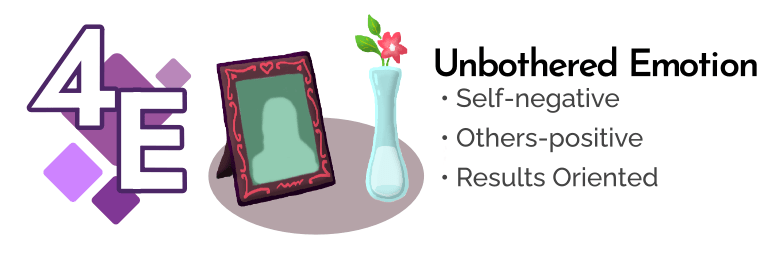
The 4E attitude is characterized by a self-negative (Es-) and others-positive (Eo+) disposition. This disposition creates an attitude that is unconcerned of how the realm of emotion may affect them. 4Es come to an understanding that outside sources have a better grasp over the aspect. The 4E feels a sense of ease regarding emotion, and generally desires quick conclusions when they are forced to produce opinions in this realm. The strategies that each 4E employs may differ in behavior or execution but the core attitude of unbothered acceptance of outside information regarding emotion will be consistent and true for all 4Es. Below are some common beliefs and behaviors that you may see with 4Es. Please keep in mind that these are generalities and do not represent the vast sub-archetypes held within the overall 4E attitude.
Dichotomies
Uncertain • Insufficient • Weak • Passive • Objective • Fearless • Flippant • Local • Distinct
Personally Unbothered
• Are quick to decide what an emotion means whenever it gets in the way of other life circumstances. Have generally even-keeled moods and ways of expressing themselves.
• At any given time, are unsure of what their true feelings are.
• Do not like to be bothered to express what they are feeling unless it is relevant.
• Can go for long periods of time without viscerally feeling any sort of relevant emotion.
• Do not concern themselves too much about the things they do feel.
• Tend to feel that their relationships will come and go when they are destined to.
• Do not place too much value on relational differences between people.
• Prefer to judge people by their merit and accept any sort of emotional reaction from anyone.
• Can remain cool under most emotional pressures so long as they are not expected to emote themselves.
• Do not get many shots of intuition, but when they do, are quick to move forward with what inspired them.
• Defer to those who wear their emotions on their sleeves as they generally do not pay attention to this within themselves.
Connoisseurs of Emotion
• Trust that their partnerships and friendships will let them know when something is wrong emotionally.
• Enjoy listening to overtly emotional music and watching others perform and create art.
• Will listen to others talk about conceptual ideas related to emotions for extended periods of time so long as they enjoy it.
• Usually trust others to correctly integrate and identify their own emotions and easily reject irrelevant emotional input.
• Are connoisseurs of understanding who can quickly translate and create meaning out of emotional and relational situations.
• Can inquire many different opinions of a relationship to understand which one is the most accurate and trustworthy, then decides quickly without fear or insecurity.
In Practice
• They are mostly easygoing and neutral about their understanding of relationships, personal feelings, culture, art, deep desires and person to person interaction.
• These types tend to focus intently on the results that can be obtained from expression and emotions, though this is not a top priority for them.
• They tend to trust in the feedback that they receive from others when inquiring in all matters related to emotion.